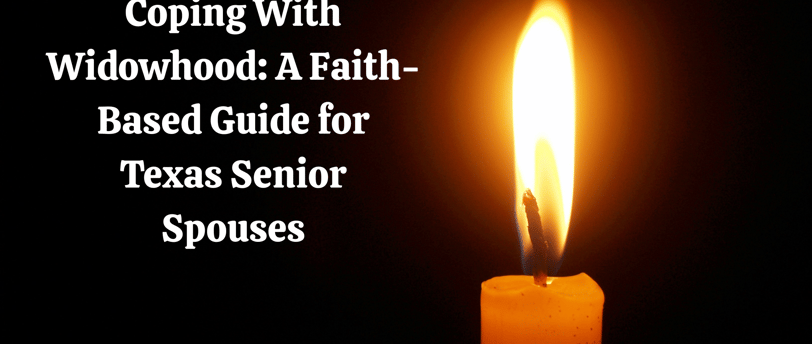Coping With Widowhood: A Faith-Based Guide for Texas Senior Spouses


Coping With Widowhood: A Faith-Based Guide for Texas Senior Spouses
"The Lord is near to the brokenhearted and saves those who are crushed in spirit." — Psalm 34:18 (NASB)
The call comes at 3 AM, or perhaps it's the moment you find them peaceful in their chair, or maybe it's after months of watching them fade away in a hospital bed. However it happens, the moment your spouse of decades takes their final breath, your world changes forever. In an instant, you transition from being part of a "we" to navigating life as an "I"—a shift that no amount of preparation can fully cushion.
Actor Jack Lemmon, who understood loss personally, once observed that "death ends life, not a relationship." For Texas seniors facing the devastating reality of widowhood, this truth offers both comfort and challenge. While death has ended your spouse's earthly life, the relationship you built together continues to shape your heart, your memories, and your daily choices as you learn to live without their physical presence.
God's Nearness in Brokenheartedness
David's words in Psalm 34:18 weren't written from academic distance—they came from a man who knew deep personal anguish and discovered God's faithful presence in the midst of crushing circumstances. The Hebrew word for "near" suggests intimate closeness, like a friend sitting beside you in silence when words fail.
This nearness isn't conditional on your faith being strong or your emotions being controlled. God draws close specifically to the brokenhearted—those whose spirits feel crushed under the weight of loss. Your tears don't drive Him away; they draw Him closer. Your questions don't offend Him; they invite His gentle response.
Understanding the Unique Challenges of Senior Widowhood
Identity Reconstruction: After 30, 40, or 50+ years of marriage, your identity became intertwined with being part of a couple. Simple introductions ("We live on Maple Street") become complicated ("I live..."). Social invitations designed for couples leave you feeling like a third wheel. Learning to see yourself as a complete person rather than half of a pair takes time and intention.
Practical Overwhelm: Your spouse may have handled specific responsibilities—finances, home maintenance, technology, or social planning. Suddenly facing these tasks alone while grieving can feel insurmountable, especially when well-meaning friends offer advice rather than practical help.
Social Isolation: Couple friends may struggle with how to include you, while other widowed friends may be reminders of loss you're not ready to face. Texas's culture of hospitality helps, but even the warmest communities can't fill the specific hole left by your spouse's absence.
Financial Concerns: Reduced Social Security income, potential loss of pension benefits, and increased single-person living costs create financial stress during an already difficult time. Medical bills from your spouse's final illness may compound these pressures.
Spiritual Wrestling: You may find yourself angry with God for taking your spouse, questioning prayers that seemed unanswered, or feeling abandoned by the faith that once provided comfort. These spiritual struggles are normal and don't indicate weak faith.
Practical Steps for the Widowhood Journey
Give Yourself Permission to Grieve Fully: Widowhood grief includes mourning not just your spouse's death but the death of your shared future—the retirement plans you'll never execute, the grandchildren they'll never meet, the conversations you'll never have. All of these losses deserve acknowledgment and tears.
Maintain Connection Through Memory: Continue celebrating your spouse's birthday, visiting places you enjoyed together, or preparing their favorite meal on special occasions. These aren't signs of inability to "move on"—they're healthy ways of honoring a relationship that death cannot erase.
Create New Routines Gradually: Don't rush to change everything immediately. Keep some familiar routines while slowly establishing new patterns that work for your changed circumstances. Perhaps you continue the morning coffee ritual but add an evening walk you never took together.
Accept Help Without Guilt: Texas communities excel at supporting grieving families, but many widowed seniors struggle to accept ongoing help. Remember that allowing others to serve you often blesses them as much as it helps you.
Make Major Decisions Slowly: Avoid selling the house, moving to a different state, or making other significant changes during the first year of grief unless absolutely necessary. Your perspective on what you need may change as you adjust to your new reality.
Rebuilding Life Without Rebuilding Marriage
Rediscover Individual Interests: Pursue hobbies, activities, or causes that interested you before marriage or that you set aside during caregiving years. Many widowed seniors discover talents and passions they'd forgotten they possessed.
Invest in Relationships: While you can't replace your spouse, you can deepen friendships with other family members, church connections, or community relationships. Consider joining widow/widower support groups where others understand your specific challenges.
Find New Purpose: Many widowed seniors discover meaningful volunteer opportunities, mentoring relationships, or advocacy work that gives their lives fresh direction. Your experience with loss often equips you to comfort others facing similar struggles.
Consider Your Legacy: Think about how you want to honor your spouse's memory and what you want your own legacy to include. This might involve charitable giving, family storytelling, or pursuing dreams you shared but never had time to accomplish.
Navigating Holidays and Special Dates
Plan Ahead for Difficult Days: Birthdays, anniversaries, and holidays can trigger intense grief waves. Plan specific ways to honor your spouse's memory while also caring for your emotional needs. This might include visiting their grave, looking through photo albums, or spending time with family who also loved them.
Create New Traditions: You don't have to abandon all couple traditions, but creating some new ones can help establish your identity as a single person. Perhaps you start hosting a different holiday meal or begin a new Christmas tradition with grandchildren.
Give Yourself Permission for Joy: Feeling happy doesn't betray your spouse's memory. Laughing at a funny movie or enjoying a beautiful sunset honors the person who loved you and wanted your happiness.
The Relationship That Continues
Lemmon's insight about relationships surviving death reflects a profound truth for Christian widows and widowers. While you can no longer share daily conversations or physical affection, the love you built together continues to influence your choices, values, and perspective on life.
Your spouse's voice may still guide your decisions ("What would he think about this?" or "She always said..."). Their values continue to shape your character. The love they gave you remains a source of strength for loving others. In this sense, death truly has ended their life but not your relationship.
Look Forward to Reunion: As a Christian, your separation is temporary. The marriage relationship may not continue in heaven as it existed on earth, but the love and connection you shared will be perfected and eternal. This hope doesn't minimize present grief but provides ultimate comfort.
Honor Their Influence: Let your spouse's positive influence continue through your life choices. If they encouraged your generosity, be generous. If they celebrated your talents, use those talents to serve others. Living well honors their memory and continues their impact on the world.
God's Sustaining Grace
The Lord who promises to be near to the brokenhearted doesn't offer quick fixes or easy comfort. Instead, He provides sustaining grace for the long journey of learning to live without your beloved spouse while maintaining hope for eternal reunion.
Your grief is the price of deep love, and your love story doesn't end with death—it transitions to a new chapter where that love continues to shape your life and bless others. In the midst of crushing sorrow, God remains near, faithful, and committed to carrying you through each difficult day.
Death has ended your spouse's life, but not your love story. God is near to your broken heart and will sustain you through this valley until you meet again.
